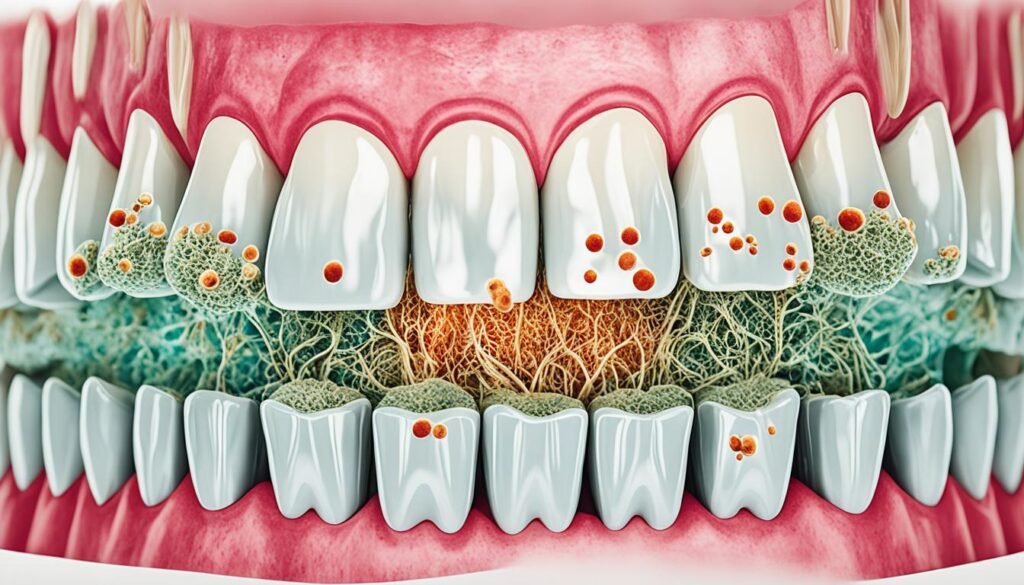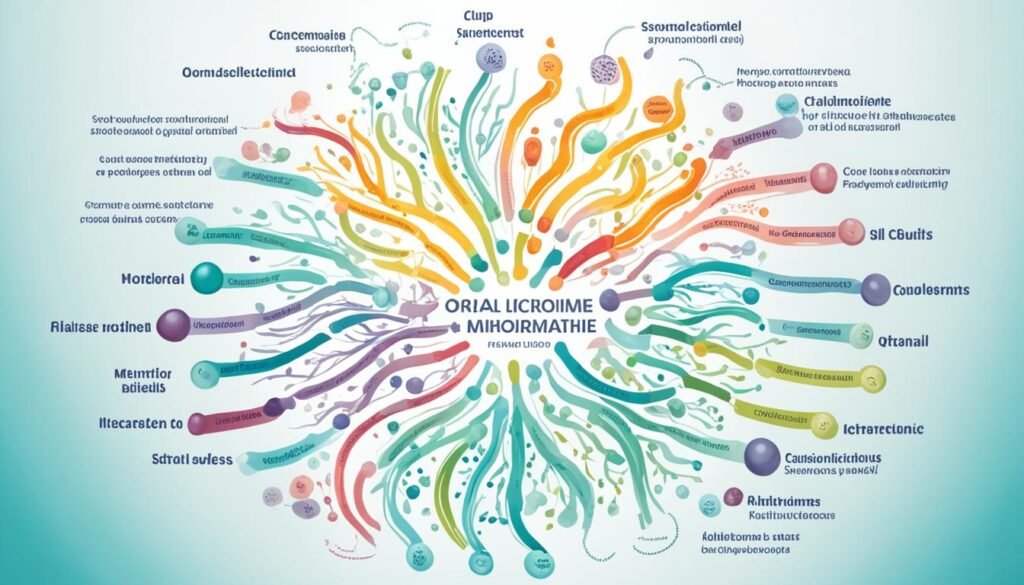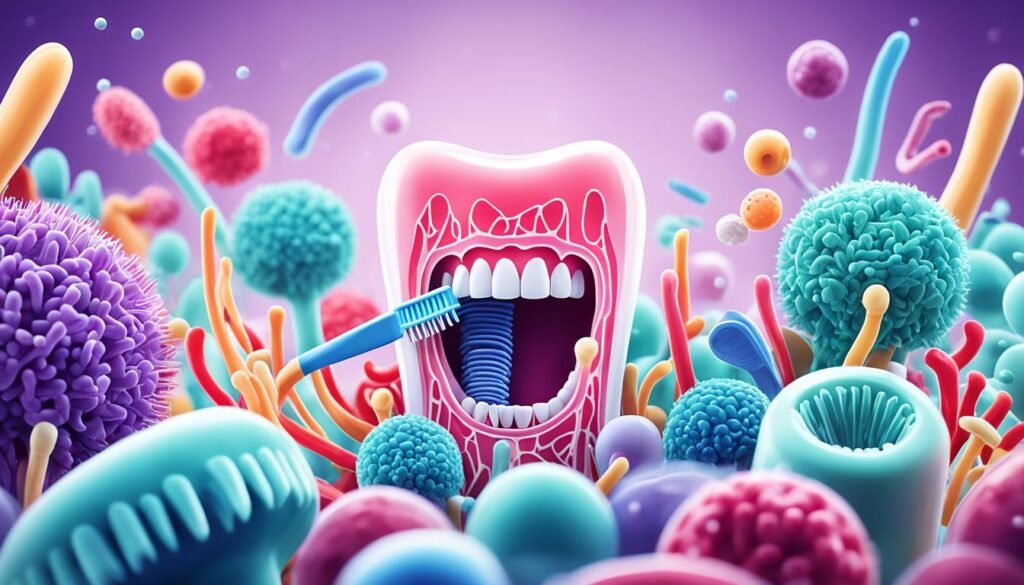Every morning, when I look in the mirror, I think about keeping my mouth healthy. It’s not just for a bright smile. It’s about taking care of the tiny living things in my mouth. These tiny creatures, known as the oral microbiome, are key to my health.
They help keep my mouth healthy and can prevent serious diseases. By taking care of them, I can avoid problems like cavities and gum disease. This also lowers the risk of heart disease, diabetes, and lung infections. It’s a vital part of staying healthy, but often overlooked.
Key Takeaways
- The oral microbiome is a diverse ecosystem of microorganisms that play a vital role in our overall health and wellness.
- Maintaining a balanced oral microbiome is essential for preventing dental issues and reducing the risk of systemic diseases.
- Good oral hygiene practices, including regular brushing, flossing, and using antibacterial mouthwash, are crucial for supporting a healthy oral microbiome.
- Tobacco use and poor dietary choices can negatively impact the oral microbiome, leading to potential health problems.
- A holistic approach to oral health, focusing on the oral microbiome, can contribute to improved overall well-being.
What Is the Oral Microbiome?
The oral microbiome is full of different microorganisms living in our mouths. It includes many species of bacteria, fungi, viruses, and protozoa. Keeping the oral microbiome balanced is key for our oral health and overall health.
The Complex Community of Microorganisms in Our Mouths
Our mouths are home to a huge variety of microbes. Research shows the oral microbiome has over 2 billion bacteria and 700 known species. This microbial diversity is crucial for our oral health.
The Importance of Maintaining a Balanced Oral Microbiome
When the oral microbial balance gets out of whack, we get oral dysbiosis. This means harmful microbes grow too much, raising the risk of dental and health problems. A healthy oral microbiome has lots of aerobic bacteria and keeps a protective film on teeth and gums.
“A balanced oral microbiome is crucial for maintaining good oral health and overall well-being.”
To fix this microbial balance, we need good oral hygiene, a balanced diet, and probiotics and prebiotics. This can stop many health issues, from bad breath and cavities to serious diseases like cancer, heart disease, and Alzheimer’s.
Consequences of Poor Oral Health and Hygiene
Good oral health and hygiene are key for more than just a nice smile. Not taking care of your teeth can cause big problems that go beyond your mouth. These problems can affect your mental health, how you feel about yourself, and what you eat.
Psychological and Social Effects
Dental problems like tooth decay and gum disease can really hurt your self-confidence. They can make you feel embarrassed, anxious, and even sad. This can stop you from going out and making friends, making things worse.
Impact on Dietary Intake and Nutritional Status
Bad oral hygiene can make eating painful. This might make you avoid certain foods. Eating less of some foods can lead to not getting enough nutrients. This can make you feel tired, weak, and not as healthy overall.
| Consequence | Impact |
|---|---|
| Psychological and Social Effects |
|
| Impact on Dietary Intake and Nutritional Status |
|
Poor oral health and hygiene have big effects on your life. They can hurt your mental health, how you interact with others, and what you eat. It’s important to take care of your teeth to live a happy and healthy life.
The Link Between Oral Microbiome and Systemic Diseases
Recent studies have found a strong link between oral health and the risk of getting certain diseases. Poor oral care and an unbalanced oral microbiome can raise the chance of heart disease, diabetes, and lung infections.
Conditions like periodontal disease cause inflammation and bacterial imbalances. These can lead to more serious health problems. Keeping your oral microbiome healthy is key to staying well.
A study looked at how periodontal disease and diabetes affect each other. It also found that exercise can help reduce inflammation in people with type 2 diabetes and periodontal disease who are at high heart risk.
| Systemic Disease | Link to Oral Microbiome |
|---|---|
| Cardiovascular Disease | Periodontopathogenic bacteria have been found in thrombi from patients with acute myocardial infarction. |
| Diabetes | Oral microbiota changes can be caused by diseases like diabetes, which may lead to oral diseases. |
| Respiratory Infections | Radiotherapy changes the oral microbiota, causing shifts and affecting mucositis. |
| Inflammatory Bowel Disease | Oral dysbiosis is linked to systemic diseases, including inflammatory bowel disease. |
| Cancer | The oral microbiome is linked to lymph node metastasis in oral cancer. Oral imbalance is also connected to pancreatic cancer and liver cirrhosis. |
These studies show how important the oral microbiome is in affecting the risk and spread of many diseases. By focusing on oral health and keeping the microbiome balanced, we can improve our overall health.
Maintaining a Healthy Oral Microbiome
Keeping a balanced oral microbiome is key for good oral health and overall well-being. Our mouths host about 700 types of microorganisms. These microbes make up the oral microbiome, with around 6 billion of them. Harmful bacteria like Streptococcus mutans and Porphyromonas gingivalis can cause dental problems. But, beneficial bacteria are vital for keeping the oral ecosystem in balance.
Good Oral Hygiene Practices
Good oral hygiene is crucial for a healthy oral microbiome. This means:
- Brushing your teeth twice a day with a soft-bristled toothbrush
- Flossing often to clear out plaque and food bits
- Going for regular dental checkups and cleanings
The Role of Diet in Supporting the Oral Microbiome
A balanced diet is also key for a healthy oral microbiome. Eating less sugar and processed foods and more probiotic and prebiotic foods helps. Probiotics, found in foods like yogurt, kefir, and fermented veggies, fight bad bacteria and prevent bad breath. They also help fight gum disease.
By supporting a diverse oral microbiome, we can lower the risk of dental problems and boost overall health. A good oral care routine, with proper hygiene and a balanced diet, keeps the mouth healthy and thriving.
Managing Systemic Diseases for Oral Health
Keeping our oral microbiome healthy is key, especially when fighting systemic diseases. Conditions like diabetes and heart disease can upset the balance in our mouths. This leads to inflammation and makes us more likely to get mouth problems.
Diabetes is closely linked to our oral microbiome. Long et al. (2017) found a strong link between type 2 diabetes and the mouth’s bacteria. Tonelli et al. (2023) also showed a link between heart disease and the mouth’s bacteria, with some numbers as high as 403.
Working with doctors to manage these diseases helps keep our mouth healthy. This approach lowers the chance of mouth problems and boosts overall health.
Addressing Inflammatory Conditions
Inflammatory bowel disease (IBD) can also affect our mouth’s bacteria. Khor et al. (2021) found a link between IBD and the mouth and gut bacteria. Alqaderi et al. (2021) studied Kuwaiti teens and found different mouth bacteria in those with different weights.
By tackling these conditions and keeping our mouth’s bacteria in balance, we can improve our health and well-being.
| Systemic Disease | Impact on Oral Microbiome | Relevant Statistics |
|---|---|---|
| Diabetes | Strong link between type 2 diabetes and oral microbiome | Risk ratio of 636-643 (Long et al., 2017) |
| Cardiovascular Disease | Correlation between oral microbiome and disease pathophysiology | 386-403 instances of impact (Tonelli et al., 2023) |
| Inflammatory Bowel Disease (IBD) | Interconnectedness between oral and gut microbiomes | 496 instances of microbial balance (Khor et al., 2021) |
| Varied Body Mass Index | Salivary microbiome diversity | 1222 instances of varied microbiome compositions (Alqaderi et al., 2021) |
By managing these diseases, we can keep our mouth’s bacteria healthy. This reduces the risk of mouth problems and helps us feel better overall.
Oral Health and Microbiome: A Functional Dentistry Approach
In functional dentistry, the mix and balance of the oral microbiome are key for good oral health and overall health. Dentists focus on the whole body, seeing how oral health connects to the rest of us. They use personalized diets, teach patients, and work with other doctors to keep the oral microbiome balanced. This helps fix oral health problems and supports overall health.
Promoting a Balanced and Diverse Oral Microbiome
The oral cavity is home to over 700 types of bacteria. Keeping these bacteria in balance is vital for avoiding oral diseases like cavities and gum disease. These problems can come from an imbalance in the oral microbiome.
- Functional dentists help patients create plans for better oral health and overall health. This includes special diets and better oral hygiene.
- They work with other doctors to fix any health issues that might affect the mouth.
- This way, patients can keep a balanced oral microbiome. This leads to better oral health and overall health.
“The mouth is one of the most heavily colonized parts of the human body, with over 700 species of bacteria calling it home.”
The Importance of Hydration for Oral Health
Keeping our mouths healthy is key to our overall health, and drinking enough water is a big part of that. Water helps clean our mouths by washing away food bits and balancing the mouth’s pH levels. This supports good bacteria and stops bad bacteria from growing.
Drinking enough water also makes our mouths produce more saliva. Saliva is a natural protector that keeps our teeth and gums healthy. It washes away food, preventing plaque and cavities from forming.
| Benefits of Staying Hydrated for Oral Health | Consequences of Dehydration |
|---|---|
|
|
Drinking enough water helps create a healthy mouth environment. This supports a balanced oral microbiome and boosts overall health. It can also improve your life quality.
“Staying hydrated is essential for maintaining a healthy oral microbiome and preventing common oral health problems. Water is the key to a balanced and thriving mouth.”
Oral health and microbiome: A Dietary Guide
A balanced diet is key to a healthy oral microbiome. This supports good oral health. By knowing how our diet affects our oral microbiome, we can make better choices. This keeps our smiles healthy and bright.
Foods that Support a Healthy Oral Microbiome
To keep our oral microbiome diverse and healthy, eating foods rich in probiotics and prebiotics is important. Foods like yogurt, kefir, and fermented veggies are full of good bacteria. Leafy greens, nuts, and seeds feed the good bacteria we already have.
- Yogurt and kefir: These dairy products contain live, active cultures that can help recolonize the mouth with beneficial bacteria.
- Fermented vegetables: Sauerkraut, kimchi, and other fermented veggies are rich in probiotics that support oral health.
- Leafy greens: Spinach, kale, and other leafy greens are prebiotic-rich, providing fuel for the good bacteria in the oral microbiome.
- Nuts and seeds: Almonds, walnuts, chia seeds, and flaxseeds are excellent sources of prebiotics that can promote a balanced oral ecosystem.
Foods to Limit for a Balanced Microbiome
It’s also key to limit foods high in sugar and processed foods. These can upset the balance of our oral microbiome. This can lead to more harmful bacteria and oral health problems.
- Sugar-rich foods: Candy, cookies, and other sugary treats can feed the growth of harmful bacteria in the mouth, leading to an imbalance in the oral microbiome.
- Processed foods: Highly processed, refined carbohydrates found in items like white bread, crackers, and chips can also disrupt the oral microbiome.
By choosing foods that support a healthy oral microbiome, we can keep our oral health in check. This helps us stay well overall.
“A balanced diet that nourishes the oral microbiome is the foundation of a healthy smile.”
The Role of Probiotics in Oral Health
Keeping our oral microbiome healthy is key to our overall health. Adding probiotics to our oral care can help a lot. Probiotics are live microorganisms that help our oral health when eaten in the right amounts.
Studies show that probiotics can really help with oral health problems. For example, one study found they can cut down pregnancy-related gingivitis by up to 44%. Another study showed that using probiotics along with dental cleanings can lessen chronic gum disease and bad breath.
The probiotic Lactobacillus reuteri is great for chronic gum disease. Patients taking probiotic tablets saw a big drop in gum pocket depth. Reviews and studies also back up the use of probiotics as a helpful addition to gum care, lowering gum pockets and swelling.
Probiotics also help balance the oral microbiome, leading to fewer harmful bacteria, less plaque, and less gum inflammation in healthy people. The probiotic Streptococcus salivarius M18 is good for fighting bad breath and cavities. It stays in the mouth and makes more of a substance that fights bacteria.
By fixing an imbalance of microorganisms, probiotics can help prevent and treat oral health problems. Adding foods, supplements, or oral probiotic rinses to your daily routine can keep your oral microbiome healthy. This leads to a smile you can be proud of.
| Probiotic Strain | Oral Health Benefit | Study Details |
|---|---|---|
| Lactobacillus reuteri | Reduced chronic periodontitis | Patients administered with probiotic tablets showed a significant decrease in probing depth. |
| Streptococcus salivarius M18 | Improved oral malodor and caries | Persistence of this probiotic is dose-dependent and can augment its bacteriocin production and adhesion characteristics. |
| Bifidobacterium bifidum | Potential nutraceutical applications | Studied for their functionality and nutraceutical applications as probiotic microorganisms. |
“Probiotics have shown promise in modulating the impact of aging in adults, and have been associated with improved serum folate availability in pregnant women.”
Avoiding Tobacco and Medications Impacting Oral Microbiome
Keeping our oral microbiome in balance is key to our health. But, some lifestyle choices and medicines can upset this balance. Tobacco, like smoking and vaping, is a big problem.
Using tobacco harms our oral microbiome. It changes the mix of microbes in our mouths. This makes it easier for bad bacteria to grow. It can lead to gum disease, tooth decay, and even oral cancer.
Some medicines can also hurt our oral microbiome. They can make us produce less saliva, leading to dry mouth. Without enough saliva, our mouths can’t keep the right balance of microbes. This lets bad bacteria take over and cause oral health problems.
- Tobacco products, including smoking and vaping, can deplete the body of oxygen and increase the adherence of harmful bacteria to the teeth.
- Medications that reduce saliva production can create an environment that favors the growth of disease-causing microbes, leading to dry mouth and other oral health issues.
- By avoiding tobacco and being mindful of the potential side effects of certain medications, individuals can help maintain a healthy and balanced oral microbiome.
To keep our oral microbiome healthy, we should brush, floss, and get regular dental check-ups. Eating foods rich in probiotics can also help. By making these choices, we can keep our mouths healthy and our smiles bright for life.
“Maintaining a balanced oral microbiome is crucial for our overall health and well-being.”
Infections and Their Impact on the Oral Microbiome
Keeping our oral microbiome healthy is key to our overall health. Viral and fungal infections can upset this balance, leading to problems. Oral thrush, a common fungal infection, is one such issue that thrives in an unbalanced mouth.
Oral thrush, or candidiasis, happens when Candida albicans fungus grows too much in the mouth. This throws off the balance of our oral microbiome, causing dysbiosis. An unbalanced microbiome lets harmful microbes grow, leading to oral health issues.
- Viral infections like the common cold or flu can weaken our defenses, letting bad microbes take over.
- Fungal infections like oral thrush can upset the balance, leading to an overgrowth of Candida albicans and other bad species.
- These infections make it easier for harmful bacteria to grow, causing gum disease, tooth decay, and even health problems beyond the mouth.
It’s important to deal with infections quickly to keep our oral microbiome balanced. Working with dental and healthcare providers helps prevent and treat infections. This keeps our oral health and overall life quality good.
“Polymicrobial synergy and dysbiosis in inflammatory disease” showed how an imbalance in microbes can lead to health problems.
Studies show infections greatly affect our oral microbiome. Viral and fungal infections can upset the balance, leading to more harmful microbes and dysbiosis.
Keeping our oral microbiome healthy is key to avoiding infections and staying well. By working with healthcare experts and practicing good oral hygiene, we can keep our microbiome balanced. This reduces the risk of infections and their problems.
The Oral Microbiome: A Holistic Approach to Overall Well-being
Our oral health is more than just about our teeth and gums. It’s about the trillions of microorganisms in our mouths, known as the oral microbiome. This tiny world is key to our overall health. By focusing on our oral health, we can boost our physical, mental, and social health.
Keeping our oral microbiome balanced is crucial. An imbalance can lead to serious diseases like heart disease, stroke, and diabetes. It can also affect our eating habits, nutrition, and how we feel about ourselves.
To keep our oral microbiome healthy, we need to take care of it. This means brushing, flossing, and seeing the dentist regularly. Eating foods rich in nutrients also helps our microbes stay diverse and balanced. This approach helps us stay healthy in body and mind.
Health Centered Dentistry in Anchorage knows how important oral health is for our overall well-being. Our team works with patients to create plans that fix oral health problems and boost whole-body wellness.
“Oral health is not just about the health of our teeth and gums; it’s a gateway to our overall well-being. By embracing a holistic approach, we can unlock the true power of the oral microbiome and embark on a journey of lifelong health and happiness.”
The oral microbiome is a complex ecosystem. Understanding its role in our health helps us keep it balanced. This approach not only helps our teeth and gums but also improves our life quality, mental health, and prevents diseases.
| Statistic | Impact |
|---|---|
| The oral microbiome comprises trillions of microorganisms. | Highlights the complexity and importance of the oral microbiome. |
| Research suggests a link between gum disease and an increased risk of heart disease and stroke. | Emphasizes the connection between oral health and systemic diseases. |
| Individuals with diabetes are more prone to gum disease due to impaired infection-fighting abilities. | Illustrates the bidirectional relationship between oral health and overall health conditions. |
| $390 billion is spent annually on global oral care. | Underscores the significant economic impact of oral health issues. |
| 1 in 2 people suffer from dental diseases. | Highlights the prevalence of oral health problems and the need for a holistic approach. |
By focusing on oral health, we can unlock the oral microbiome’s potential. This can improve our dental health, prevent diseases, and enhance our life quality. Taking care of our oral microbiome is a key step towards better overall wellness.
Conclusion
The oral microbiome is key to a healthy mouth and overall health. By understanding the complex mix of microorganisms in our mouths, we can improve our oral health. This means practicing good oral hygiene, eating well, drinking plenty of water, and managing any health issues.
By focusing on oral health, we can get a beautiful smile and support our overall health. This reduces the risk of diseases and makes life better. New research and technology help us understand and treat our oral microbiome better, offering personalized care.
Keeping our oral microbiome healthy is crucial for a great smile and overall wellness. By focusing on oral health, we can live better, stop harmful bacteria, and lower disease risk. Let’s work together for a future where oral health is key to our health and wellness.
FAQ
What is the oral microbiome?
Why is maintaining a balanced oral microbiome important?
How can poor oral health and hygiene impact overall health?
What is the connection between the oral microbiome and systemic diseases?
How can I maintain a healthy oral microbiome?
How can managing systemic diseases impact oral health?
What is the role of probiotics in maintaining oral health?
How can lifestyle factors and medications impact the oral microbiome?
How can infections affect the oral microbiome?
Source Links
- https://serenbedental.com/2024/02/26/keeping-your-oral-microbiome-balance-for-a-healthy-mouth-and-body/ – Keeping Your Oral Microbiome Balance for a Healthy Mouth and Body – Dental Wellness at Serenbe
- https://www.rupahealth.com/post/the-role-of-the-oral-microbiome-in-maintaining-healthy-teeth-and-gums – No title found
- https://www.ncbi.nlm.nih.gov/pmc/articles/PMC6503789/ – Oral microbiome: Unveiling the fundamentals
- https://www.nature.com/articles/s41579-023-00963-6 – The oral microbiome: diversity, biogeography and human health – Nature Reviews Microbiology
- https://doctorstaci.com/learn/the-power-of-the-oral-microbiome/ – The Power of the Oral Microbiome – Doctor Staci – Healthy Teeth + Happy Lives
- https://www.mayoclinic.org/healthy-lifestyle/adult-health/in-depth/dental/art-20047475 – Oral health: A window to your overall health
- https://www.ncbi.nlm.nih.gov/pmc/articles/PMC9405223/ – Oral Microbiota, Its Equilibrium and Implications in the Pathophysiology of Human Diseases: A Systematic Review
- https://www.ncbi.nlm.nih.gov/pmc/articles/PMC8774214/ – Oral Microbiome, Oral Health and Systemic Health: A Multidirectional Link
- https://www.mdpi.com/2036-7481/14/4/127 – The Interaction between the Oral Microbiome and Systemic Diseases: A Narrative Review
- https://www.sunstargum.com/gb-en/oral-health/oral-microbiome-guide-dental-patients.html – A Simplified Guide to Oral Microbiome and Why It Matters
- https://www.gutmicrobiotaforhealth.com/the-oral-microbiome-a-double-face-in-health-and-disease/ – The oral microbiome: a double face in health and disease
- https://www.realsimple.com/oral-microbiome-affects-overall-health-7111828 – 5 Ways to Support Your Oral Microbiome for the Best Overall Health
- https://www.ncbi.nlm.nih.gov/pmc/articles/PMC10304820/ – Oral Microbiome in Health and Disease: Maintaining a Healthy, Balanced Ecosystem and Reversing Dysbiosis
- https://www.nature.com/articles/s41368-022-00163-7 – Oral microbiota in human systematic diseases – International Journal of Oral Science
- https://www.nature.com/articles/sj.bdj.2016.865 – The oral microbiome – an update for oral healthcare professionals – British Dental Journal
- https://www.ifm.org/news-insights/the-oral-microbiome-systemic-disease/ – The Oral Microbiome & Systemic Disease
- https://drwillcole.com/functional-medicine/the-oral-microbiome-and-how-it-affects-your-health – How The Oral Microbiome Is A Key To Better Health
- https://www.ncbi.nlm.nih.gov/pmc/articles/PMC6605021/ – Oral microbiome and health
- https://www.perionc.com/healing-your-oral-microbiome-a-pathway-to-a-healthier-mouth/ – Healing Your Oral Microbiome: A Pathway to a Healthier Mouth
- https://nutritionsource.hsph.harvard.edu/oral-health/ – Oral Health
- https://www.ncbi.nlm.nih.gov/pmc/articles/PMC10953787/ – Mediterranean diet: a potential player in the link between oral microbiome and oral diseases
- https://www.ncbi.nlm.nih.gov/pmc/articles/PMC9227938/ – A Cross-Talk between Diet and the Oral Microbiome: Balance of Nutrition on Inflammation and Immune System’s Response during Periodontitis
- https://www.ncbi.nlm.nih.gov/pmc/articles/PMC5688201/ – Use of Probiotics and Oral Health
- https://www.ncbi.nlm.nih.gov/pmc/articles/PMC10534711/ – The Benefits of Probiotics on Oral Health: Systematic Review of the Literature
- https://www.ncbi.nlm.nih.gov/pmc/articles/PMC10912582/ – Effect of different forms of tobacco on the oral microbiome in healthy adults: a systematic review
- https://askthedentist.com/oral-microbiome/ – The Oral Microbiome & Its Impact on Every Other System in the Body
- https://translational-medicine.biomedcentral.com/articles/10.1186/s12967-022-03785-x – The role of the oral microbiome in smoking-related cardiovascular risk: a review of the literature exploring mechanisms and pathways – Journal of Translational Medicine
- https://www.ncbi.nlm.nih.gov/pmc/articles/PMC8457218/ – The oral microbiome: Role of key organisms and complex networks in oral health and disease
- https://www.rejuv-health.com/biological-dentistry/oral-microbiome/ – Oral Microbiome: What it is & how it impacts your health | Rejuvenation Health
- https://www.frontiersin.org/journals/oral-health/articles/10.3389/froh.2023.1293228/full – Frontiers | Editorial: The impact of inflammation on the oral microbiome
- https://www.hcdentistryak.com/the-oral-microbiome-exploring-the-connection-between-oral-health-care-and-overall-health/ – Oral Health Care in Anchorage | Health Centered Dentistry
- https://www.primalhealthllc.com/about-us – ABOUT US | Primal Health
- https://www.ncbi.nlm.nih.gov/books/NBK578293/ – Conclusion – Oral Health in America
- https://www.pershingfamilydental.com/the-impact-of-microbiome-research-on-oral-health-what-you-need-to-know/ – The Impact of Microbiome Research on Oral Health: What You Need to Know – PERSHING FAMILY DENTAL | Dentist in Central El Paso, TX
- https://www.insightdental.com/unveiling-the-microbiome-how-oral-bacteria-influence-overall-health/ – Unveiling the Microbiome: How Oral Bacteria Influence Overall













